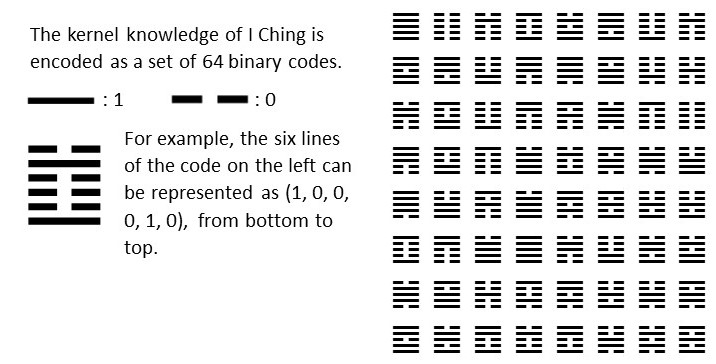The Resonance Code: Rebirthing of Ancient Poetry-Songs
At the beginning of April, my co-authors and I released our book, The Resonance Code – Empowering Leaders to Evolve Toward Wholeness. Although I am the lead author and have written every word, when I hold this book in my hand, I still feel odd saying I wrote it, considering eight months before the release of the book, I was in denial that I was writing a whole darn book! Honestly, the more accurate statement is that the book chose to write itself in spite of me.
Resonance Code is a reincarnation of I Ching, the Book of Change, an ancient Chinese cosmological system. I Ching sees the cosmos as a living and breathing being, complex and ever-evolving. I Ching offers specific guidance on relating with this magnificent being in which our human life unfolds. Its kernel knowledge is a simple set of 64 six-digit binary codes, not unlike the computer language we use today. Yet, this binary language arose roughly 5000 years ago, about 2000 years before Chinese characters appeared.

Unlike modern scientists and engineers, the ancient Chinese took a very different approach with these binary codes. First, they used the codes to describe the internal world of psyche, instead of the external, material world. Second, instead of using the codes to program software, they wrote poetry-songs. (In Chinese, the phrase poetry, 诗歌, means both poetry and songs. It was a common practice to put music to poetry so one can sing the poems.) Later, prominent scholars such as Confucius (about 200 BC), Duke of Zhou and King Wen (about 1000 to 750 BC) annotated the poetry-songs and added commentaries to interpret and explain the ancient poetry-songs. Their commentaries and annotations became what is referred to as I Ching today.
Humans have been on Earth for about two million years. Written language didn’t appear until about 3000 years ago. Imagine the level of creativity being birthed when written language was invented! What was it like for humans to live on the cusp of that birthing? What kind of circumstances and challenges catalyzed the invention of written languages?
We can’t know for sure. What we can surmise is that today, humanity is in the midst of another birthing at the same intensity and scale. This birth is characterized by signs such as climate crisis, ecological collapse, explosion of technological inventions, large scale automation of jobs that are currently done by humans, as well as political and economic upheavals. The world we know is disassembling while a new, unknown world is being born every day. No one can predict the outcome of this change, yet everyone is subject to it. It is no surprise that I Ching chooses to be reborn at this time!
Poetic Mind and Linear Rational Mind
This rebirth of I-Ching is a child from a marriage between the poetic mind and the linear, rational mind. (Note: in Chap 3 of the book, I described the poetic mind and linear, rational mind as the feminine and masculine modes of the psyche.) With the risk of over-simplification, I use a common idea to illustrate the difference between the poetic and linear rational mind. The poetic mind is akin to what is referred as the right-brain intelligence, artistic, visual and holistic. The linear mind is the left-brain intelligence, logical, symbolic and reductionist. When we see through the lens of poetic mind, we see the universe as a communion of subjects. Rocks, rivers, stars, humans and animals are all various constellations of subjective experience. When we see through the lens of linear, rational mind, we see the universe as a collection of objects. Rocks, rivers, humans and animals are now reduced to their material constituents under the gaze of linear minds. To see through both eyes, we will experience the world as a dance between the two minds, which we call resonance.
I am not a poet. Although I love reading poetry, especially classical Chinese poetry, I did not study poetry writing. However, I did spend most of my life energy cultivating a robust poetic mind. I hold a vision that the poetic mind is the new wayfinder with which humanity will navigate the maze of political, economic and environmental uncertainty and complexity we are facing today.
Poetic mind is the ability to weave new meanings and make new connections between existing concepts and ideas to shine a light on what is not yet apparent and give voice to those who are not yet heard. More importantly, it does so in a way that elicits emotional resonance of the heart. Through the emotional resonance of the heart, we are connected to the “true north”, the life force larger than our separated and confined individual existence. Thus, the poetic mind is the wayfinder that will help us align our personal and collective life force through this world of complexity and uncertainty.
The raw potential of the poetic mind is our birthright. The minute we start to learn language, we begin engaging our poetic mind. Young children who have not been through formal schooling naturally use poetic mind. With limited vocabulary, they derive new meanings and point to things they do not yet know. Although their thoughts might be simple and crude, they have no trouble coming up with fresh, original thoughts that crack our hearts open.
It is, of course, natural for a three-year-old to think original thoughts as their minds are not stuffed with other people’s thoughts, yet. Sadly, when we enter formal schooling, the emphasis of education shifts us abruptly out of the poetic mode and bends our minds forcefully, sometimes violently toward its counterpart, the linear, rational mind.
Linear rational mind extracts our subjective experience of living into objects, categories, labels and bits of information. The early part of my childhood education was severely skewed toward elevating the linear rational mind above the poetic mind. Activities that emphasized the poetic mind, support imagination or cultivate empathy were deemed as peripheral and unnecessary, whereas subject matter that emphasized the linear, rational mind such as science and technology were given much higher priority. With this dynamic, the raw potential of our poetic mind does not get to develop to its full potential in modern education.
While linear rational mind extracts objects out of subjective experience, poetic mind weaves objects back into the subjective experience touching the emotional chords of the heart and generating resonance. Linear rational mind reduces the living bodies of nature into maps and GPS coordinates. Poetic mind reconstructs maps and coordinates back into an enlivened experience of a place through stories, myths and imagination.
Neurobiologist and psychiatrist Iain McGilchrist compiled massive amounts of data from neuroscience, psychology and sociology on the two hemispheres of the brain in his book The Master and His Emissary: The Divided Brain and the Making of the Western World. His research suggests that poetic mind is actually the “master” of our intelligence, whereas the left-brain mind, the linear rational, is a servant. He suggests we are living in a stage of civilization where the servant has rebelled against the master. As a result, the productions from the linear, rational mind, namely, technology, sever us from life rather than connect.

Here is a simple exercise to experience the relationship between the two modes of mind. Take a look at the picture. if I ask you to engage your poetic mind to describe this picture, you first need to recognize, with your linear rational mind, the various objects in the picture – the path, the fallen leaves, the forests and fog. Then you put yourself into the picture so you can activate your subjective sensing and feeling. What do you feel as you imagine taking a stroll on that path? What other objects come to mind that are not explicitly shown in the picture? Your poetic mind may compose something like this:
The forgotten memories of a life-long journey,
like fallen leaves,
linger on a secret path before the snow sets in
In the eternal cycles of creation, the poetic and linear rational mind are a pair of lovers. They need each other. Without the poetic mind, the collection of objects constructed by the linear rational mind forms a cold and desolate universe, crying for the warmth of life and the tender stroke of love and compassion. Without the linear rational mind, the poetic mind will be like an impoverished weaver with empty hands, no yarns and threads to weave, nor gems or stones to adorn her garments.
Like any couple, their relationship also contains tension and opposition. In their worst moments, they can be locked in a power struggle. The risk for the poetic mind is that it can get stuck in the beauty and harmony it has created and fall to sleep. That is what happened to the ancient Chinese dynasties. Being stuck in their internal harmony, the sleepy nation lost the impetus and motivation to advance technologically. In the end, its 5000 years of dynasty crumbled under the marching force of western colonization beginning with the Opium Wars in the 19th century.
The linear rational mind, on the contrary, tends to close itself off within the boundary of knowledge it has created, excluding the poetic mind as irrational or chaotic, or even deeming it dangerous. This is especially true in the domain of engineering and technology. Certainly, there is no room for poetic mind when calculating the structural solidity of a bridge or a skyscraper. Siloed in its own kingdom, the linear rational mind tends to ignore the fact that most of the seminal scientific advancement comes from scientists who respect the poetic mind and know how to draw inspiration from their wild imaginations. Albert Einstein said it all in this quote, Imagination is more important than knowledge. Knowledge is limited. Imagination encircles the world.
Obsessed with the muscle to dominate the natural world, the single-minded linear, rational mind may trap itself in an illusion that it is the creator, forgetting that it is meant to be the servant of poetic mind, the connection to the fountain of life. That is how our modern day culture, led by science and technology, plunged us into an ecological disaster and climate crisis, leaving a carnage of disembodied lifestyles everywhere on the planet.
As in any healthy relationship, these two lovers need to renew their relationship contracts and agreements from time to time. We are living in a time when the old contract that binds these two hemispheres of human intelligence are breaking down, while new ones are being birthed. This contract cannot be written with pen and paper or typed into a Word document on a laptop. This contract has to be written through the transformation of our own psyches, notarized by the very path we choose to walk at this time on Earth.
The Reunion Between the Poetic and Linear Rational Mind: An Invitation to Voyage into The Resonance Code

Following the lineage of I Ching, The Resonance Code brings the poetic mind into a domain from which it has been largely excluded, especially in modern western culture. This domain lies at the intersection of psychology, leadership, systems thinking and human development. The Resonance Code lays a foundation allowing the integration of the poetic mind and linear rational mind and activating a new paradigm of social discourse, a social movement as well as a new approach to leadership.
If you feel drawn to The Resonance Code, your psyche may hold key ingredients that will bind the poetic and linear rational mind into a new contract. As we navigate through the immense crisis we face by virtue of our presence on Earth at this time, we need to be aware the contract forged through our lifetime will last for generations, perhaps thousands of years. The changes we are facing are that immense.
If you feel called to participate in something larger than your own life, if you feel a yearning for cooperation between your poetic and linear rational minds, if you like to explore how your poetic mind can become the master wayfinder in a world of complexity and uncertainty, I invite you to consider join a book study course: Voyage into Resonance Code .

